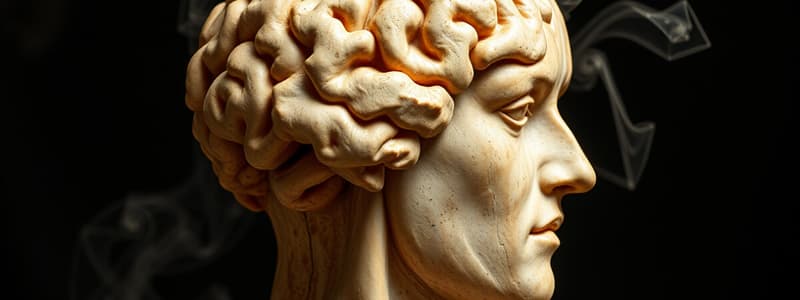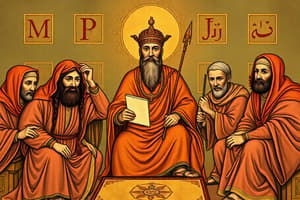Podcast
Questions and Answers
Match the following concepts with their definitions:
Match the following concepts with their definitions:
Understanding = Distinguishes humans from computers and beasts Socratic Method = Fosters critical thinking through questions Philosophy of Questions = Explores the significance and structure of questioning Aristotelian Principles = Foundation for logical reasoning and categorization
Match the following thinkers or concepts with their associated statements:
Match the following thinkers or concepts with their associated statements:
Aristotle = Disappointed by the lack of student questions Computers = Do not question their programming Apes = Exhibit problem-solving abilities without questioning Philosophers = Debate the distinction between humans and animals
Match the following levels of intelligence as described by Aristotle:
Match the following levels of intelligence as described by Aristotle:
Gods = Know too much to ask questions Men = Question their existence and understanding Brutes = Know too little and cannot formulate questions Animals = Curious but lack sophisticated language
Match the following statements with their correct descriptions:
Match the following statements with their correct descriptions:
Match the following philosophical ideas with their implications:
Match the following philosophical ideas with their implications:
Match the following terms related to intelligence with their meanings:
Match the following terms related to intelligence with their meanings:
Match the following behaviors with their corresponding entities:
Match the following behaviors with their corresponding entities:
Match the following attributes with their respective categories:
Match the following attributes with their respective categories:
Match the concept with its description:
Match the concept with its description:
Match the philosopher's question with its philosophical category:
Match the philosopher's question with its philosophical category:
Match the philosophical approach with its proponent:
Match the philosophical approach with its proponent:
Match the concept with its characteristic:
Match the concept with its characteristic:
Match the distinction between humans and computers:
Match the distinction between humans and computers:
Match each philosophical principle with its definition:
Match each philosophical principle with its definition:
Match the following terms with their relevance to questions:
Match the following terms with their relevance to questions:
Match the philosophical terms with their associated thinkers:
Match the philosophical terms with their associated thinkers:
Match the explanation with the related cognitive function:
Match the explanation with the related cognitive function:
Match the human capability with its description:
Match the human capability with its description:
Match the following philosophical concepts with their descriptions:
Match the following philosophical concepts with their descriptions:
Match the following figures of philosophy with their associated methods or principles:
Match the following figures of philosophy with their associated methods or principles:
Match the following terms with their roles in philosophical inquiry:
Match the following terms with their roles in philosophical inquiry:
Match the following concepts with their definitions:
Match the following concepts with their definitions:
Match the following philosophical ideas with their proponents:
Match the following philosophical ideas with their proponents:
Match the following statements with their classifications:
Match the following statements with their classifications:
Match the following philosophers or ideologies with their views on human individuality:
Match the following philosophers or ideologies with their views on human individuality:
Match the following aspects of human cognition with their characteristics:
Match the following aspects of human cognition with their characteristics:
Match the following philosophical themes with their implications:
Match the following philosophical themes with their implications:
Match the following terms associated with questions and understanding:
Match the following terms associated with questions and understanding:
Match the following types of reasoning with their definitions:
Match the following types of reasoning with their definitions:
Match the following distinctions between humans and computers:
Match the following distinctions between humans and computers:
Match the following attributes with their corresponding entities:
Match the following attributes with their corresponding entities:
Match the following forms of inquiry with their focuses:
Match the following forms of inquiry with their focuses:
Match the following qualities necessary for human cognition with their definitions:
Match the following qualities necessary for human cognition with their definitions:
Match the following concepts with their descriptions:
Match the following concepts with their descriptions:
Match the following terms with their significance in philosophy:
Match the following terms with their significance in philosophy:
Match the following philosophical critiques with their explanations:
Match the following philosophical critiques with their explanations:
Match the following ideas to their implications in understanding humanity:
Match the following ideas to their implications in understanding humanity:
Match the following philosophers' concepts with their foundational ideas:
Match the following philosophers' concepts with their foundational ideas:
Match the following terms with their relevance to philosophical thought:
Match the following terms with their relevance to philosophical thought:
Match the following philosophical concepts to their outcomes in debate:
Match the following philosophical concepts to their outcomes in debate:
Match the following arguments with their critical flaw:
Match the following arguments with their critical flaw:
Match the following elements of argumentation with their definitions:
Match the following elements of argumentation with their definitions:
Match the following philosophical tools with their functions:
Match the following philosophical tools with their functions:
Match the following components of a proposition with their definitions:
Match the following components of a proposition with their definitions:
Match the following philosophical concepts with their implications:
Match the following philosophical concepts with their implications:
Match the following terms used in argumentation with their descriptions:
Match the following terms used in argumentation with their descriptions:
Match the following aspects of the Socratic Method with their descriptions:
Match the following aspects of the Socratic Method with their descriptions:
Match the classical concepts of Aristotle with their definitions:
Match the classical concepts of Aristotle with their definitions:
Match the following distinctions between humans and computers:
Match the following distinctions between humans and computers:
Match the following types of concepts with their significance:
Match the following types of concepts with their significance:
Match the following aspects of logical inquiry with their roles:
Match the following aspects of logical inquiry with their roles:
Match the following reasoning techniques with their roles in argumentation:
Match the following reasoning techniques with their roles in argumentation:
Match the following philosophical concepts with their descriptions:
Match the following philosophical concepts with their descriptions:
Match the following statements with their related concepts:
Match the following statements with their related concepts:
Match the following philosophical concepts with their related descriptions:
Match the following philosophical concepts with their related descriptions:
Match the following characteristics to their related philosophical themes:
Match the following characteristics to their related philosophical themes:
Match the following terms with their meanings in philosophical discourse:
Match the following terms with their meanings in philosophical discourse:
Match the following thinkers or ideas to their associated statements:
Match the following thinkers or ideas to their associated statements:
Match the following concepts with their implications in understanding intelligence:
Match the following concepts with their implications in understanding intelligence:
Match the following thinkers or principles with their associated statements:
Match the following thinkers or principles with their associated statements:
Match the following terms related to understanding with their definitions:
Match the following terms related to understanding with their definitions:
Match each statement with the corresponding philosophical practice:
Match each statement with the corresponding philosophical practice:
Match the following attributes of human cognition to their explanations:
Match the following attributes of human cognition to their explanations:
Match the following phrases with their philosophical implications:
Match the following phrases with their philosophical implications:
Match the following philosophical inquiries with their respective focus areas:
Match the following philosophical inquiries with their respective focus areas:
Match the following characteristics of concepts with their descriptions:
Match the following characteristics of concepts with their descriptions:
Match the following elements of the Socratic Method with their functions:
Match the following elements of the Socratic Method with their functions:
Match the following elements of the Philosophy of Questions with their purposes:
Match the following elements of the Philosophy of Questions with their purposes:
Match the following Aristotelian Principles with their descriptions:
Match the following Aristotelian Principles with their descriptions:
Match the following aspects of understanding concepts with their characteristics:
Match the following aspects of understanding concepts with their characteristics:
Match the following distinctions between humans and computers with their features:
Match the following distinctions between humans and computers with their features:
Match the following cognitive functions with their corresponding characteristics:
Match the following cognitive functions with their corresponding characteristics:
Match the following philosophical ideas with their implications:
Match the following philosophical ideas with their implications:
Match the following roots of knowledge with their associated philosophers:
Match the following roots of knowledge with their associated philosophers:
Match the following types of questions with their corresponding categories in philosophy:
Match the following types of questions with their corresponding categories in philosophy:
Match the following elements of the Socratic Method with their definitions:
Match the following elements of the Socratic Method with their definitions:
Match the following philosophers with their contributions to understanding concepts:
Match the following philosophers with their contributions to understanding concepts:
Match the following distinctions between human cognition and computer processing:
Match the following distinctions between human cognition and computer processing:
Match the following forms of understanding with their definitions:
Match the following forms of understanding with their definitions:
Match the following philosophical questions with their areas of exploration:
Match the following philosophical questions with their areas of exploration:
Match the following concepts with their respective implications in understanding:
Match the following concepts with their respective implications in understanding:
Match the following philosophical terms with their definitions regarding human capabilities:
Match the following philosophical terms with their definitions regarding human capabilities:
Match the following aspects of philosophical inquiry with their focuses:
Match the following aspects of philosophical inquiry with their focuses:
Match the following Aristotelian principles with their explanations:
Match the following Aristotelian principles with their explanations:
Flashcards are hidden until you start studying
Study Notes
Understanding: The Distinction of the Human Mind
- Philosophy differentiates humans from beasts and machines, emphasizing a unique cognitive capability: understanding.
- A concerning trend shows individuals unable to distinguish human intelligence from computer functionality, undermining classical philosophical principles.
- Both animals and computers exhibit limited reasoning; however, asking questions is a distinctly human trait.
- Aristotle identified three levels of intelligence: gods, men, and brutes, noting questioning as the hallmark of human intelligence.
Logical Inquiry
- The three fundamental questions guiding human understanding are: What? Whether? and Why?
- The act of understanding leads to concepts in our minds, which are essential for grasping reality.
- Concepts are not physical; they exist independently in our minds, allowing us to understand the essence of things.
Essence vs. Existence
- Understanding concepts enables the comprehension of reality, distinguishing between essential natures and individual instances.
- For example, the concept of "house" transcends individual houses, highlighting the differences between abstract knowledge and physical objects.
Comprehension vs. Extension
- Comprehension involves understanding the inherent attributes of a term (e.g., "man" as a rational animal), while extension relates to all instances the term applies to.
- Generalizations that express universal truths (e.g., "all men are mortal") require insight beyond mere observation and involve abstract thinking.
- Distinguishing concepts aids in understanding philosophical debates regarding reality; individual experiences and universal truths are integrally connected.
Philosophical Implications of Comprehension and Extension
- The tension between universals and individuals poses significant philosophical and practical consequences.
- If universals are deemed real, it can lead to a hierarchy where individuals are secondary, potentially paving the way for totalitarian ideologies.
- Conversely, rejecting the existence of universals leads to skepticism, suggesting that reality is subjective and chaotic.
Extension and Comprehension of Terms
- Each term encompasses both extension (the actual instances referred to by the term) and comprehension (the meaning associated with the term).
- For example, the extension of "man" refers to all existing human beings, while the comprehension reflects the understanding of what it means to be human as a rational being.
Concept vs. Physical Existence
- Concepts are immaterial entities; their essence transcends physical reality.
- The understanding of an apple relies on sensory perception and mental cognition.
- Without sensory experience or a functioning brain, the concept of an apple would not exist.
Mental Existence of Concepts
- Knowledge grants a thing a second existence in the mind, transforming it into a thought.
- The human mind is unique in providing a second life to concepts, a capability not found in the physical universe.
Differences in Understanding
- Distinction exists between terms (words denoting objects) and concepts (mental representations).
- Terms represent the basic units of meaning and can be subjects or predicates in propositions.
- Propositions (e.g., "Apples are fruits") can be true or false, whereas terms are defined as either clear or ambiguous.
The Role of Logic
- Logic revolves around asking fundamental questions: What is it? Is it? Why is it?
- Understanding essences sets humans apart from computers, which lack true understanding and merely process data.
Characteristics of Concepts
- Concepts allow comprehension of reality, existing independently of the physical objects they represent.
- They exhibit five main characteristics compared to material items:
- Spiritual: Non-material and cannot be physically contained or weighed.
- Abstract: Concepts extend beyond specific instances (e.g., the concept of "tree" encompasses all trees).
- Universal: A single concept can apply to multiple objects (e.g., "beauty" as a judgment applicable to various contexts).
- Necessary: Concepts arise from the inherent need to classify and understand the world.
- Unchanging: Concepts maintain their meaning regardless of physical changes in reality.
Abstraction vs. Concrete Understanding
- The critique of abstraction overlooks its significance; babies are concrete but lack developed civilization.
- While concrete realities inspire more immediate emotional responses, abstract ideas also play crucial roles in thought and philosophy.
Universal Concepts
- Universal concepts enable comparative judgments (e.g., assessing beauty across locations).
- They signify common essences that can be applicable across multiple instances, uniting various entities under one conceptual framework.
Studying That Suits You
Use AI to generate personalized quizzes and flashcards to suit your learning preferences.




